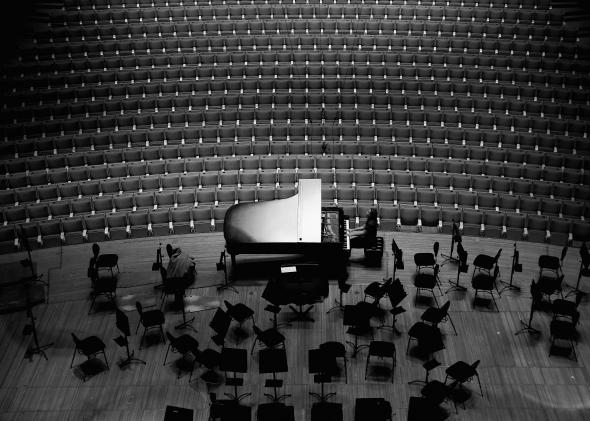What Kind of Stress Do Full-Time Composers Experience?

This question originally appeared on Quora.
Answer by Andrew Watts, Composer:
1) Being a full-time contemporary classical composer in the United States essentially means teaching and/or arts administration. With national funding and commissioning for music in the state that it is, nearly all U.S. composers make their living (or the bulk of it) through organizational and institutional affiliation. This duality of purpose and focus is stressful by nature. How is one supposed to be an effective teacher/professor/director/conductor all day and then have enough time (or even motivation) to fit in composing at a consistently high level? Some composers find frustration in this system, dissatisfied that their craft of composition, which they value and devote so much time toward, is not financially self-sustaining. The fact they need to do so many other things that may have varying relations to their core passion is upsetting at least from a time-optimization point of view.

Photo by Cameron Spencer/Getty Images
2) The level of awareness (or lack there of) the general public has toward contemporary classical music is also depressing. Part of this is a misunderstanding of the goals a modern composer has when writing a new work. Many concertgoers are not prepared to listen to challenging music. Whether it be the normal top 40 on the radio or even the classical canon, the average audience member is used to being spoon fed the same ideas time and time again. When presented with an experimental work, they have not been taught how to process or evaluate it. I often get shocked responses from non-new music types about how (for some reason) they thought my music would sound like Mozart. Yet, these same people would never expect a new film to be a carbon copy of a classic film like Citizen Kane.
3) Another facet of stress is likely to do with the lack of exposure new music has even within venues dedicated to this Western concert tradition. Unfortunately, not all lovers of classical music, no matter how die-hard they may be, are supporters of living composers via performance or patronage. As a result, it can be at times stressful to continually explain what it is you do and why it is culturally significant for classical music to be a living art form, always progressing rather than stagnating. In the fine art world, popular "modern" museums have millions of visitors a year with lines out the door for equally experimental projects, albeit with a differing medium. Abstract art has become trendy in American culture, fetching thousands (even millions) of dollars for the top artists. What was the last contemporary classical work to bring the composer millions
4) Lastly, composition as a career is an extremely competitive environment. As mentioned above, it is often necessary to have the support of an institution, such as a university or conservatory, in order to make a living in the U.S. as a contemporary classical composer. With the example of becoming a faculty member at a university, a composer generally needs: a) to have a solid grounding in performance and musical fundamentals from high school or before b) gain admittance at a top undergraduate composition program [these usually accept 10 percent to 20 percent] c) gain admittance at a top master's composition program [these usually accept 5 percent to 15 percent] d) participate in numerous festivals, workshops, masterclasses, internships, competitions, etc. e) gain admittance at a top doctoral composition program (many of these take four students a year out of 100-plus applications; f) wait until a current university composer retires or dies, and then be one of the few lucky applicants to land a professorship (at any given time there may be only a dozen or so institutions hiring, and there will always be top competition from all over the world for these spots).
Please note that many, many composers do care a lot about these other musical disciplines (education, administration, performing, conduction, directing, etc) and are glad they are able to carry out these additional roles. Nevertheless, it is still a point of stress that comes with being a composer.
More questions on classical music:
